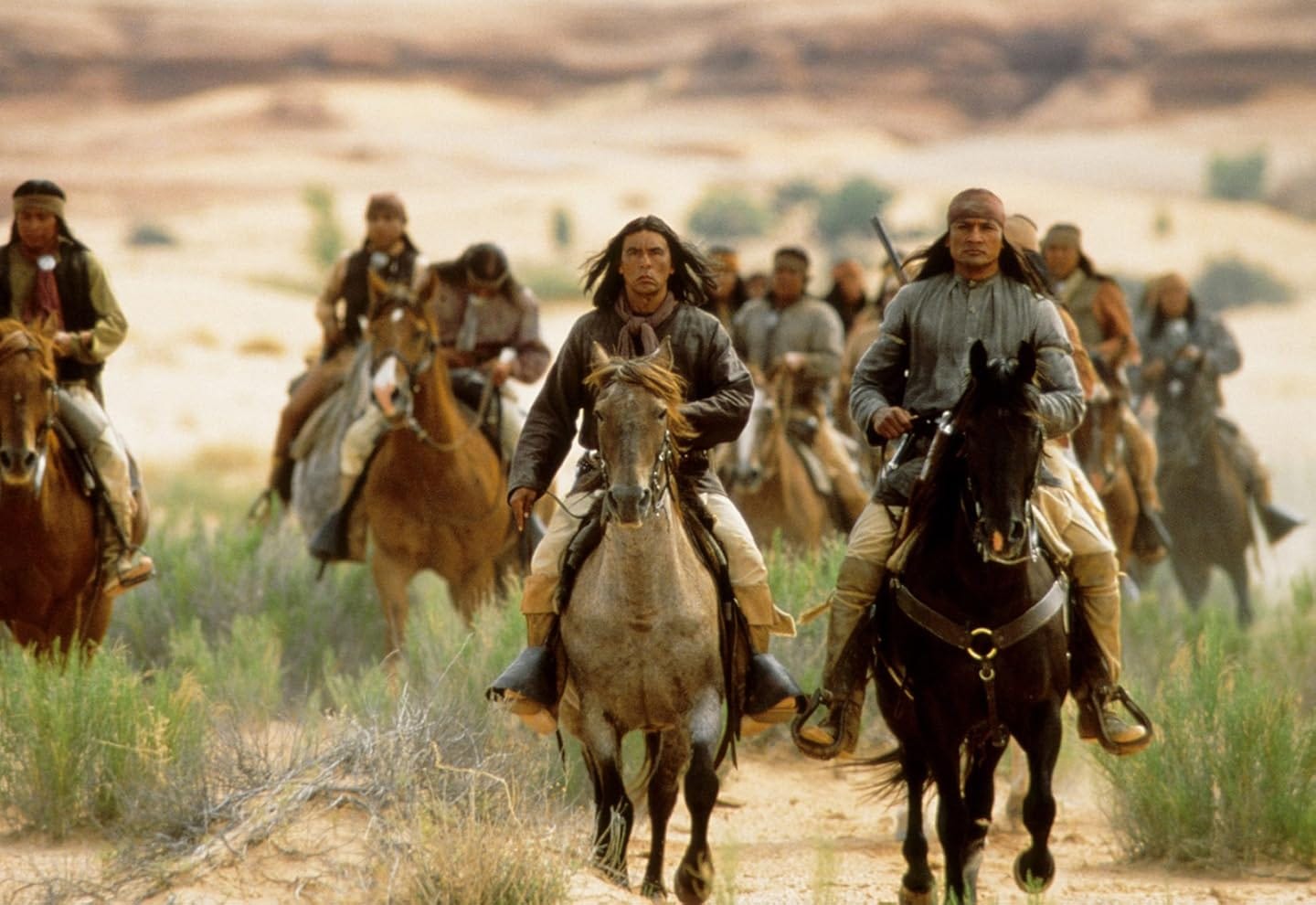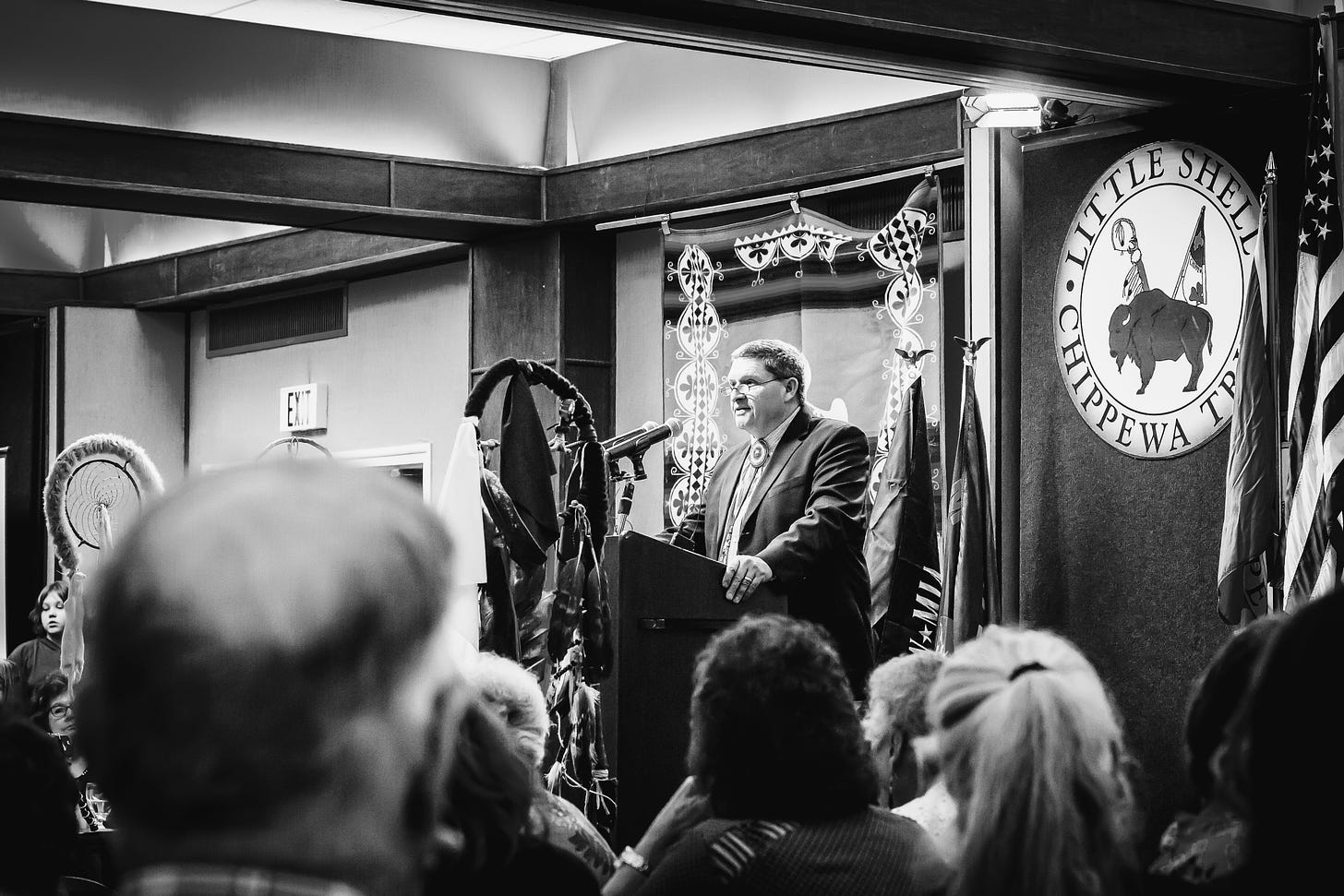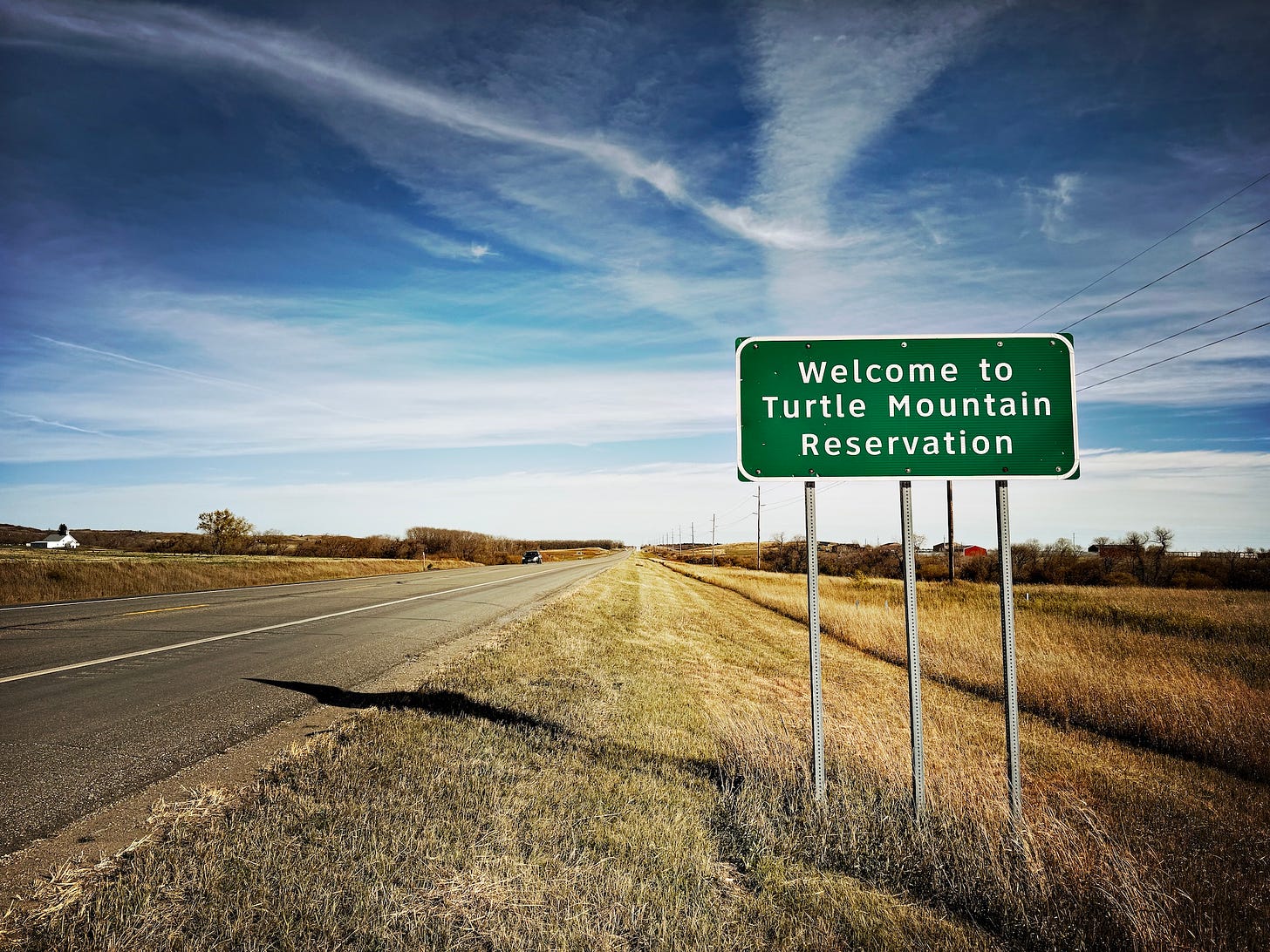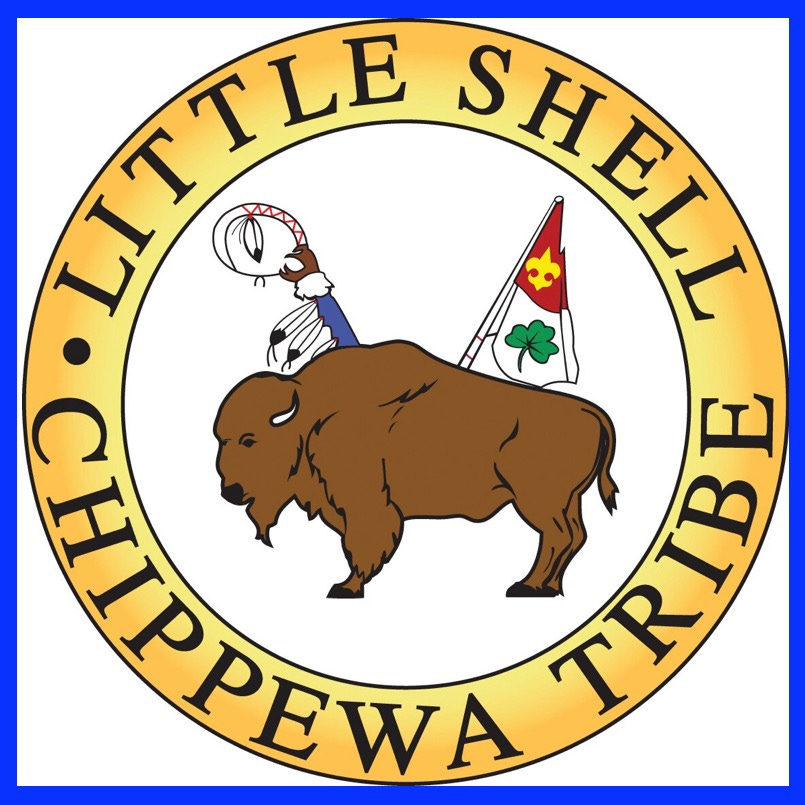Boozhoo, indinawemaaganidog! Aaniin! That is to say hello, all of my relatives! Welcome to another edition of An Irritable Métis. Five years ago today, on December 20, 2019, the President of the United States signed the $738 billion defense bill, aka the National Defense Authorization Act, which included an attachment called the Little Shell Restoration Act. With the stroke of his cray … er, pen, the Little Shell Tribe of Chippewa Indians received our federal restoration after 150+ years of being denied. It’s been a huge deal and I’m grateful for all the struggles by so many people for generations to make it happen. What a story it has been, one I hope I’ve captured well enough with Becoming Little Shell. Additionally, the Montana Free Press ran a story a couple days ago about this, which you may check out HERE. Matt Hudson did a nice job with it and I am grateful.
The events leading up to our federal restoration also resulted in the first post I ever made to this newsletter1. This was back when I thought what I did here would be a companion to writing the book. Funny thing is that it’s more that now than it’s ever been. Meanwhile, when I first started writing this newsletter I had no idea the impact it would have on me personally2 and how huge the support of all of you who support me, paid or not, would be. It’s gone above and beyond any of my imaginings. Whenever I pause and consider it I find it almost difficult to believe. From the bottom of my heart I offer my thanks and gratitude. I hope I continue to offer perspective here worthy of your continued support. I know the newsletter bubble is, if not burst, certainly sagging a bit, or turning into something far more gross than we ever wanted it to become. That so many of you choose to remain in this space is truly a gift.
What follows is something I began writing in the wake of the November 5th election. As I mentioned last week, I think we are looking at a long and difficult stretch in our shared community. I believe the story of the Little Shell offers a concrete example of how extreme hardship can be overcome with dedication. We never gave up the struggle and I hope none of you who are suffering do either. I hope it makes sense.

I've been thinking a lot about what it must have been like for Chief Little Shell in the fall of 1892 when he faces the realization that the greedy bureaucrats from the United States have successfully deployed a plan to strip him of his ability to negotiate for the land and future of the people he has devoted his life to the preservation of. When he realizes that despite his accepted and recognized role as a hereditary chief of the Pembina, now Turtle Mountain, Chippewa, a position he’s inherited from his father more than two decades earlier, he will not be allowed to speak during an interaction that will determine the fate of his community for generations to come. What a moment that must have been. How his heart must have strained, even if he had seen the chicanery coming, which he likely had.
I picture that scene cinematically. There are stamping horses and a group of lean and serious Indians mounted on them, clad in a motley array of clothing and hats and jackets, bristling with rifles and knives and war clubs. Nervous soldiers sit their own mounts, sweat oozing down their cheeks into unkempt beards. I picture Little Shell as he stares grimly into the eyes of his enemies, and with sadness into the eyes of those from his own community who have betrayed him. Friends. Relatives. And yes, rivals. Then Little Shell and his followers wheel their horses around and ride off to the west, dust billowing in their wake, their forms silhouetted against a setting sun. In my mind the credits roll over a montage of settler wagons spreading across the landscape, an irresistible tide, drums and wailing song a faint soundtrack. Screen slowly melts to black until only the drumming and singing remains, and then they go silent as well.
Of course, the reality was much different than that image, given the previous couple years had been periods of extreme hardship. By 1892 the great buffalo herds that sustained these people for generations are eradicated. The people are bedraggled and starving and defeated. Little Shell himself is an old man. He didn’t raise a rifle to fight, he sent his lawyer. He will only live about another decade anyway, depending on which account you believe, and as he and his followers depart that scene in the region of what is now Belcourt, North Dakota, on the Turtle Mountain Reservation, I wonder if he ever even saw the Turtle Mountains again, and what a tragedy that is. He was a refugee now, just like millions around the world today.
I think about everything Little Shell saw in his life, beginning perhaps in the 1850s with the Sweet Corn Treaty, which was “to define hunting and territorial boundaries so that there was no cause for warfare and so that resources would be shared without animosity.” That negotiation likely involved his father, the second Little Shell, but our Little Shell, as a boy, possibly attended the negotiations, or knew about them. He was on the fringes of so much that unfolded in the coming years even before he was responsible for making the life and death decisions. Like the Treaty of Old Crossing in 1863, in the aftermath of which his father vowed to never negotiate with the United States again. That decision set the tone for every action the feds took with anyone named “Little Shell” from that point forward.
Fast forward another decade to the early 1870s when Little Shell, our namesake Little Shell, becomes hereditary chief of the Pembina people. Little Shell must contend with settlers overrunning and actively gobbling up the land of his people. He finally negotiates a reservation in North Dakota and his people become the Turtle Mountain Chippewa. Their reservation is 450,000 acres, only to be reduced 90% in two years, because the people who decide such things, the white people, the imperialists, the settler colonialists, determine that because all of the members of the Turtle Mountain Chippewa don't live there full time, that they don't need all of that land. So it is shrunk to the dimensions it occupies today. A diaspora of people that had been a trickle becomes a flood.
By this time the buffalo, the source of all life to these people, are essentially extinct, victims of a different kind of vicious and utter genocide. This is upheaval of monumental proportions to all the Plains Indians forced to remake cultures that have functioned a certain way for hundreds and hundreds of years practically overnight. None could.
This remaking is the crux of it all, how my people have had to reinvent ourselves in the wake of catastrophic changes to their lives, more than once. I am talking about ice ages. I'm talking about the coming of people from somewhere else who want no part in sharing the land or the life ways that have existed on Turtle Island for thousands of years. I'm talking about diseases that wiped out 90% of Native populations; I’m talking about black robes coming and telling people that they can no longer believe the things that they believe and have armies behind them to enforce it. I’m talking about children being taken from their families to boarding schools in an effort to violently remake language and culture. I’m talking about generations of children who grow up to become parents with no concept of what it means to be a parent, no role models for how parenting should happen.
As like so many of us today, when Little Shell rode away from those negotiations in 1892, despite the horrors he’d witnessed the last 30-40 years he had no idea of what was to come. How in just a few decades the dominant buffalo culture on the Northern Plains would be reduced to pockets of families scraping by however they could to survive, citizens of nowhere, living on the edges of garbage dumps on the fringes of settler communities, and how they would be forced to do so for generations just to survive.
I am here because of their commitment to survival and I won’t forget that.

I reiterate these examples of hardships – and these are just a fraction of them – to demonstrate that suffering has been part of the fabric of the United States and how it chooses to grind people up for its own benefit for as long as it has existed. What we are potentially facing is nothing new, it just happens to be poised to affect people who long thought of themselves as immune.
I want to tell you though that, despite our marginalization, we Little Shell never gave up, and that is where I find strength.
We continued to send delegations to Washington, DC to overturn the decisions that were made against us over and over again. We didn’t do this through charismatic leaders, we did it from the grassroots up. Every day people gathering to strategize. Poor people. People who devoted their lives to the success of an undertaking that some of them probably knew wouldn't see come to fruition, but they did it anyway. Many times we came close only to be denied at the 11th hour; in 2018, for example, one pitiful, power hungry little white man denied 1000s of people the restoration we deserve, just because he could. Yet we persevered, we persisted, and a year later we gained our restoration, and now we're doing magnificent things for our community. Not just our tribal community, but the people we share the land with, people that we are often in disagreement with, even in opposition to, but have figured out ways to exist with.
And I tell this story of the Little Shell Chippewa as an example of the long game and how sometimes great change, great justice takes generations to bring home. But it doesn’t happen without a lot of effort by people who maybe think they don’t have the power to make great change. But change begins in small places, like in grange halls and coffee shops and around kitchen tables.
I am wary of the coming months and years. But I am not in despair. Not for a moment. I have reasons to have a mighty faith. Thousands of them and counting.
The anniversary of which will be one week from today, on December 27th.
It remains the most significant contributor to my actual damn living, I think.





“What we are potentially facing is nothing new, it just happens to be poised to affect people who long thought of themselves as immune.”
Fair and important point. When I puff up full of righteous indignation about the most recent “unprecedented” chicanery even before the new administration takes office, I’m mindful that many, many people have endured worse and longer. Which outlines a kind of duty - a responsibility to do what I can to help a collective effort to not only endure but also to help change the structures that withhold resources from folks long denied.
I’m honestly not sure what that is today, but I’ll be looking up, not down. Thanks for your words of encouragement and reminder that we can endure and overcome.
Hooray for the 5th anniversary of the re enfranchisement of the Little Shell! I recall the literal shouts of hurrah in the hallways of the Dept of Education at MSU when we heard. Everyone knew this was a Big Deal.
Cheers,
-Nigel
Miigwech for pointing out that we are the result of the hopeful dreams of thousands of ancestors. Too often, I lose that perspective and feel like a failure. And miigwech for all the work you're doing to be a good ancestor, Chris!
It occurs to me that seven generations ago, this settler nation state didn't exist. And seven generations from now, it (probably) won't exist. So in the long game, whether or not the United States grants Indigenous people federal recognition will become meaningless. If we really decolonize our thinking, who will we be when the United States has passed into history and we're still here? This could be next year …